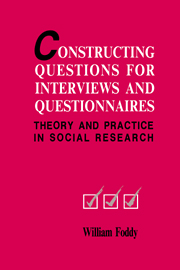Book contents
- Frontmatter
- Contents
- Tables
- Figures
- Preface
- Chapter 1 An initial statement of the problem
- Chapter 2 A theoretical framework
- Chapter 3 Defining topics properly
- Chapter 4 Formulating intelligible requests for information
- Chapter 5 Contextual influences on respondents' interpretations of questions
- Chapter 6 The need to provide response frameworks
- Chapter 7 The limitations of human memory
- Chapter 8 Filters: establishing the relevance of questions to respondents
- Chapter 9 Reducing question threat
- Chapter 10 The open vs. closed questions debate
- Chapter 11 Measuring attitudes
- Chapter 12 Checks to ensure that questions work as intended
- Chapter 13 Concluding comments
- The tap paradigm
- References
- Index
- Acknowledgements
Chapter 1 - An initial statement of the problem
Published online by Cambridge University Press: 04 September 2009
- Frontmatter
- Contents
- Tables
- Figures
- Preface
- Chapter 1 An initial statement of the problem
- Chapter 2 A theoretical framework
- Chapter 3 Defining topics properly
- Chapter 4 Formulating intelligible requests for information
- Chapter 5 Contextual influences on respondents' interpretations of questions
- Chapter 6 The need to provide response frameworks
- Chapter 7 The limitations of human memory
- Chapter 8 Filters: establishing the relevance of questions to respondents
- Chapter 9 Reducing question threat
- Chapter 10 The open vs. closed questions debate
- Chapter 11 Measuring attitudes
- Chapter 12 Checks to ensure that questions work as intended
- Chapter 13 Concluding comments
- The tap paradigm
- References
- Index
- Acknowledgements
Summary
There is no doubt that the use of verbal data has come to dominate the social sciences. Asking questions is widely accepted as a cost-efficient (and sometimes the only) way, of gathering information about past behaviour and experiences, private actions and motives, and beliefs, values and attitudes (i.e. subjective variables that cannot be measured directly). A review of practices adopted in the 1960s revealed that:
the sociologist today limits himself rather generally to the construction and conduct of questionnaires and interviews. In 1940–41, 25 per cent of the 85 empirical studies depended on interviews and questionnaires for their data; in 1965–66, 48 per cent did. However, if we consider studies based on secondary data that, in turn, derived from interviews, then 64 per cent of the 136 research papers in the latter two years were based on such verbal reports.
Increasingly, these verbal reports are limited to expressions of attitudes, feelings, and opinions rather than to factual accounts of past behaviour and interactions. In 1940–41, 8 of the 22 studies using questionnaires and interviews obtained statements about opinions or feelings, 6 focused on actual behaviour and 8 gathered information about both past behaviour and attitudes. In 1965–66, 49 of 66 studies in which interviews were collected dealt only with opinions and sentiment, 6 with behaviour and 8 with both behaviour and attitudes.
- Type
- Chapter
- Information
- Constructing Questions for Interviews and QuestionnairesTheory and Practice in Social Research, pp. 1 - 11Publisher: Cambridge University PressPrint publication year: 1993



